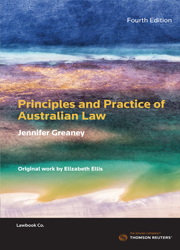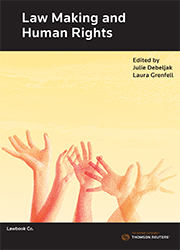
Books on human rights in Australia are generally located at KM 226.
 50 human rights cases that changed Australia
by
Lucy Geddes & Hamish McLachlan
The first book of its kind, 50 Human Rights Cases that Changed Australia summarises Australia's 50 most significant and influential human rights cases. The cases include landmark human rights cases from all Australian states and territories. They range from the seminal freedom of expression and First Nations land rights cases of the 1990s, to lesser-known earlier cases on civil liberties and criminal procedure and more recent advances in LGBTIQA+ rights, environmental rights, and the rights of people with disabilities. Each case summary explains, in plain language, the facts, the issues and the outcome of the case. Each summary also contains key quotes from the judgment, commentary situating the case in its social and political context, and critical analysis of the case's impact. The first half of the book contains summaries of cases that have advanced the rights of particular groups in the Australian community: First Nations rights; women's rights; LGBTIQA+ rights; disability rights; children's rights; asylum seeker and refugee rights; prisoners' rights. The second half of the book contains summaries of cases dealing with particular human rights: the right against racial discrimination; the right to liberty; criminal justice rights; the right to freedom of expression; democratic rights; the right to a healthy environment; and the rule of law. The cases demonstrate the potential of the law to achieve justice, as well as its limitations. They also reveal Australia's human rights protections to be piecemeal and inadequate -- illustrating the urgent need for a constitutional bill of rights. Written by two practising human rights lawyers, this anthology is an essential resource for law students, lawyers and activists. It also provides an engaging overview to anyone who might be curious about how the law, and in particular litigation, has advanced human rights in Australia.
50 human rights cases that changed Australia
by
Lucy Geddes & Hamish McLachlan
The first book of its kind, 50 Human Rights Cases that Changed Australia summarises Australia's 50 most significant and influential human rights cases. The cases include landmark human rights cases from all Australian states and territories. They range from the seminal freedom of expression and First Nations land rights cases of the 1990s, to lesser-known earlier cases on civil liberties and criminal procedure and more recent advances in LGBTIQA+ rights, environmental rights, and the rights of people with disabilities. Each case summary explains, in plain language, the facts, the issues and the outcome of the case. Each summary also contains key quotes from the judgment, commentary situating the case in its social and political context, and critical analysis of the case's impact. The first half of the book contains summaries of cases that have advanced the rights of particular groups in the Australian community: First Nations rights; women's rights; LGBTIQA+ rights; disability rights; children's rights; asylum seeker and refugee rights; prisoners' rights. The second half of the book contains summaries of cases dealing with particular human rights: the right against racial discrimination; the right to liberty; criminal justice rights; the right to freedom of expression; democratic rights; the right to a healthy environment; and the rule of law. The cases demonstrate the potential of the law to achieve justice, as well as its limitations. They also reveal Australia's human rights protections to be piecemeal and inadequate -- illustrating the urgent need for a constitutional bill of rights. Written by two practising human rights lawyers, this anthology is an essential resource for law students, lawyers and activists. It also provides an engaging overview to anyone who might be curious about how the law, and in particular litigation, has advanced human rights in Australia.
 Critical perspectives on human rights law in Australia
by
Paula Gerber & Melissa Castan (eds)
Critical Perspectives on Human Rights Law in Australia provides a comprehensive, accessible and scholarly examination of many of the key human rights issues facing Australia today. Written for human rights and legal scholars, legal practitioners and those readers who wish to increase their understanding of the field, this book provides a timely and intriguing discussion on the law and policy regarding the application of human rights standards in Australia today.
Critical perspectives on human rights law in Australia
by
Paula Gerber & Melissa Castan (eds)
Critical Perspectives on Human Rights Law in Australia provides a comprehensive, accessible and scholarly examination of many of the key human rights issues facing Australia today. Written for human rights and legal scholars, legal practitioners and those readers who wish to increase their understanding of the field, this book provides a timely and intriguing discussion on the law and policy regarding the application of human rights standards in Australia today.
 Principles and practice of Australian law
by
Jennifer Greaney
The fourth edition of Principles and Practice of Australian Law maintains the emphasis on context and skills as keys to understanding law in its practical operation. Within this framework, the new edition expands and updates existing material by reference to a range of important contemporary issues and cases.
Principles and practice of Australian law
by
Jennifer Greaney
The fourth edition of Principles and Practice of Australian Law maintains the emphasis on context and skills as keys to understanding law in its practical operation. Within this framework, the new edition expands and updates existing material by reference to a range of important contemporary issues and cases.
 Law making and human rights : executive and parliamentary scrutiny across Australian jurisdictions
by
Julie Debeljak & Laura Grenfell
Law Making and Human Rights examines how rights figure in the law-making process. The topics covered in this new title are presented by experts and scholars to offer a comprehensive analysis of how rights are scrutinised in all Australian jurisdictions.
Law making and human rights : executive and parliamentary scrutiny across Australian jurisdictions
by
Julie Debeljak & Laura Grenfell
Law Making and Human Rights examines how rights figure in the law-making process. The topics covered in this new title are presented by experts and scholars to offer a comprehensive analysis of how rights are scrutinised in all Australian jurisdictions.
 Australia's human rights scrutiny regime : democratic masterstroke or mere window dressing?
by
Adam Fletcher
In 2010 the Australian Government decided that it would not propose a Human Rights Act, despite the relevant recommendation of the 2008-09 National Human Rights Consultation. Instead, it introduced a Human Rights Framework comprising several measures to enhance human rights protection, including theHuman Rights (Parliamentary Scrutiny) Act 2011. The scrutiny regime under that Act was designed to ensure rights would be given due consideration before Commonwealth legislation was passed.
The Act created a unique 'bipartite dialogue' system, involving a formal interchange on rights compatibility between the executive and Parliament, while excluding the courts. This set the Commonwealth apart from jurisdictions such as the ACT, Victoria, New Zealand and the UK, which have statutory rights instruments administered by their courts.
The book presents a detailed study of all aspects of the scrutiny regime, and compares the regime with its closest counterparts overseas. In assessing the regime's impact, it argues that a system in which the executive and Parliament are responsible both for protecting rights and for remedying rights breaches is neither more legitimate nor more effective than one involving all three branches of government. Accordingly, it calls for strengthening reforms
Australia's human rights scrutiny regime : democratic masterstroke or mere window dressing?
by
Adam Fletcher
In 2010 the Australian Government decided that it would not propose a Human Rights Act, despite the relevant recommendation of the 2008-09 National Human Rights Consultation. Instead, it introduced a Human Rights Framework comprising several measures to enhance human rights protection, including theHuman Rights (Parliamentary Scrutiny) Act 2011. The scrutiny regime under that Act was designed to ensure rights would be given due consideration before Commonwealth legislation was passed.
The Act created a unique 'bipartite dialogue' system, involving a formal interchange on rights compatibility between the executive and Parliament, while excluding the courts. This set the Commonwealth apart from jurisdictions such as the ACT, Victoria, New Zealand and the UK, which have statutory rights instruments administered by their courts.
The book presents a detailed study of all aspects of the scrutiny regime, and compares the regime with its closest counterparts overseas. In assessing the regime's impact, it argues that a system in which the executive and Parliament are responsible both for protecting rights and for remedying rights breaches is neither more legitimate nor more effective than one involving all three branches of government. Accordingly, it calls for strengthening reforms
 Human rights in Australia
by
Justin Healey (ed)
Human rights recognise the inherent value of every person, regardless of our respective backgrounds, where we live, what we look like, what we think or what we believe. These rights are based on universal principles of dignity, equality and mutual respect, and are shared across cultures, religions and philosophies. Human rights are about being treated fairly, treating others fairly and being able to make choices about our own lives. Australia was recently elected to a seat on the United Nations Human Rights Council, however its own human rights record is not without controversy, attracting international and domestic scrutiny. What are Australia's international and domestic human rights obligations and how are they being addressed in relation to a number of issues such as asylum seeker detention, racial discrimination, free speech, indigenous advancement, juvenile incarceration, disability rights, gender equality and same-sex marriage? Does Australia need to lift its game on human rights if it is to be taken seriously on the international stage?
Human rights in Australia
by
Justin Healey (ed)
Human rights recognise the inherent value of every person, regardless of our respective backgrounds, where we live, what we look like, what we think or what we believe. These rights are based on universal principles of dignity, equality and mutual respect, and are shared across cultures, religions and philosophies. Human rights are about being treated fairly, treating others fairly and being able to make choices about our own lives. Australia was recently elected to a seat on the United Nations Human Rights Council, however its own human rights record is not without controversy, attracting international and domestic scrutiny. What are Australia's international and domestic human rights obligations and how are they being addressed in relation to a number of issues such as asylum seeker detention, racial discrimination, free speech, indigenous advancement, juvenile incarceration, disability rights, gender equality and same-sex marriage? Does Australia need to lift its game on human rights if it is to be taken seriously on the international stage?